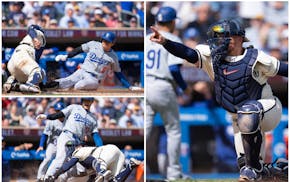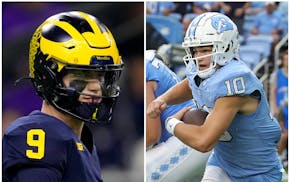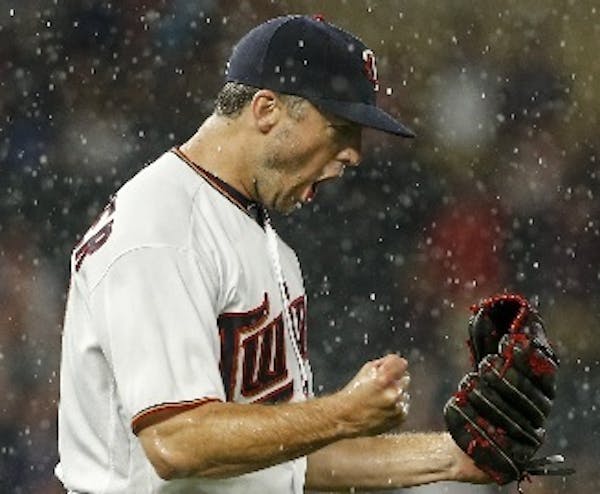August is within sight and the Twins still are competitive and relevant, so the narrative of this surprising summer remains unchanged: Buyers or sellers as the trade deadline looms?
Seems like an easy answer at present.
"I'd love to be a buyer and get a little help," closer Brandon Kintzler said after pitching a clean but wet ninth inning in a 4-2 victory against the New York Yankees on Monday at Target Field. "I don't want to be a seller."
This conversation suddenly comes against the backdrop of Bartolo Colon's scheduled start Tuesday. A strange juxtaposition this is, debating whether the Twins should buy or sell, knowing their leadership signed a pitcher close to AARP eligibility.
Colon's arrival represents a remarkable display of desperation by executives Derek Falvey and Thad Levine. The bottom of the rotation has been a revolving door of failed experiments so Falvey/Levine went two time zones outside the box in signing Colon.
And yet, the Twins can't sell. Not now. Not when a playoff spot is still a realistic objective.
The Twins stayed 1 ½ games behind Cleveland in the AL Central and moved to within a half-game of the Yankees in the wild-card standings with the win. Everyone keeps waiting for Cleveland to put its foot on the gas and run away with the division, but that remains a theory at present.
Nobody seems willing to grab control of the division. That's why the Twins should consider making moves to bolster their short term vs. selling off with an eye on their future. That line of thought could change over the next two weeks if the Twins nose-dive, but team officials should act accordingly as long as the standings reflect hope.
Vote here: Should the Twins be buyers or sellers?
Does that defy logic? Maybe. Logic says trading ace Ervin Santana for prospects that might help in the future could be smart investment. Keep building for a day when the team theoretically is better constructed as a legit contender.
Santana could fetch a decent haul from a team in win-now mode that seeks to upgrade its rotation as a final push. Plus, Santana is 34 years old and an All-Star. His value might never be greater.
The Twins' warts are glaring. They rank 27th in staff ERA and 24th in run differential. Not exactly a formula for sustained success.
But after years of dreadful baseball, the Twins have played themselves into contention, flaws and all. Clearly not a perfect team, but they reside in a flawed division. Besides, outside of the Houston Astros and Boston Red Sox, the rest of the American League looks far from scary.
Selling while in contention would send a horrible message. To the players, fans, everyone. Imagine telling Brian Dozier or Miguel Sano that, sorry, we're waving a white flag and trading Santana because the organization has grand plans for the future.
"I promise you that won't sit well," Dozier said.
He's biased, of course, but he knows the negative effect a sell-off would have on the clubhouse. Dozier believes the Twins are good enough to remain in contention until the end, which would force team executives to show their belief. Trading veteran assets if the club still is within striking distance would take serious guts by the new leadership. They're tasked with taking a long view in fixing a mess, but plans should change based on circumstances.
There's also a business component to consider. Fans have been slow to return this season, even as the team showed signs of improvement on the field and in the standings. Why risk turning off fans even more?
"[People] are talking about teams that are three or four games out thinking about selling — that doesn't make sense to me," Dozier said. "Everybody is always worried about the future, which is great. You do that in all businesses. But when you have an opportunity to do something special right now and our fans deserve something from this day forward, I don't see the point in trying to get rid of people."
Same here. As long as the Twins stay in contention, the buy-sell question answers itself.
Chip Scoggins chip.scoggins@startribune.com
Scoggins: 'Wait one more year' can't be the Wild's plan. Thankfully, it isn't.

Scoggins: Finch feeling heat of the Suns as playoff battle looms
Scoggins: Why 'championship or bust' fits these Wolves

Scoggins: Anatomy of a game-saving play as Correa throws out Ohtani


